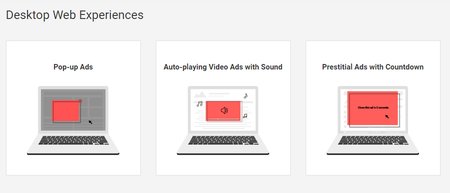 Google's Chrome web browser started blocking ads on February 15, 2018. It comes into effect for all of its billions of users, without any extensions, plug-ins or settings to tweak with. Ad blocking for all Chrome users, on by default.
Google's Chrome web browser started blocking ads on February 15, 2018. It comes into effect for all of its billions of users, without any extensions, plug-ins or settings to tweak with. Ad blocking for all Chrome users, on by default.
This might sound weird given that Google is the largest ad company in the world: almost all of its massive revenue comes from ads. But there's a logic behind all of this. Google figured out that the reason why Joe Average ever installs a third-party ad blocker is because of the annoying ads, and not simply because Joe hates ads in general. He hates those that obstruct his web browsing and/or annoy him. The problem is that most third-party ad blockers, when installed, block everything from all the websites in the world. So you get frustrated because the hobby site you're visiting has auto-play, audio-on video ads in every corner and install a third-party ad blocker. The result? You block every ad from every site you visit. Sure, you could adjust the settings to allow ads through for specific sites, but only a handful of people ever do that.
Google's thinking is this: If we can remove the annoying ads, people will be happy with the remaining, non-obstructive ads. So, they developed their own ad blocker and built it directly into Chrome.
Chrome complies with the so-called Better Ads Standard. They list 12 ad types that are most hated and should be blocked. If Google detects any of such ad formats on particular domain, it informs the domain owner and gives them 30 days to fix the issue. If domain owner fails to make appropriate adjustments, the domain will be blacklisted until the problem has been fixed. This means that all ads from that domain will be blocked, even when only some of the ads don't comply with the Better Ads Standard.
It is a major threat to get website owners to clean their sites and remove the "banned" ad formats as quickly as possible. Such formats include auto-play video with sounds on, pop-up ads prestitial ads in mobile.
Ad blocking is now live on both desktop computers and on Android devices.
Google's thinking is this: If we can remove the annoying ads, people will be happy with the remaining, non-obstructive ads. So, they developed their own ad blocker and built it directly into Chrome.
Chrome complies with the so-called Better Ads Standard. They list 12 ad types that are most hated and should be blocked. If Google detects any of such ad formats on particular domain, it informs the domain owner and gives them 30 days to fix the issue. If domain owner fails to make appropriate adjustments, the domain will be blacklisted until the problem has been fixed. This means that all ads from that domain will be blocked, even when only some of the ads don't comply with the Better Ads Standard.
It is a major threat to get website owners to clean their sites and remove the "banned" ad formats as quickly as possible. Such formats include auto-play video with sounds on, pop-up ads prestitial ads in mobile.
Ad blocking is now live on both desktop computers and on Android devices.













